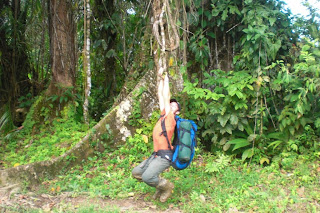We all remember our food pyramid from school, right? Of course we do. A balanced diet consists of grains, plenty of fruits and vegetables, some dairy, and the occasional fat and sugar. And regardless of the latest development in nutritionism, we all know it's good to have a varied diet. We feel the days we probably shouldn't have indulged and the days where we could really use some veggies.
So yeah, I'm painting a picture, contextual background for the folks at home... Now let's check out Austin's diet.
Grains, Etc.
When I'm not chowing down on amoebas, I'm usually eating boiled green bananas. After all, you wouldn't want those starches to go waste by turning into those pesky, delicious sugars. Boiled green bananas are sort of like chowing down on a plate of potatoes. Sometimes you get salt. Sometimes. When they want to go crazy, they mash the boiled bananas together into a cake and then serve slices. Except there wasn't anything added to the cake. Cake makes it sound delicious, which is deceiving since it's still... boiled... green... bananas.
OK, so after amoebas and bananas there's daichin, another regional favorite. Daichin is a tuber, like yucca or well, kinda like a potato. Again, sometimes with salt, usually served the preferred a la carte, simple.
We ended the pifa season this month. By the end of two months of all pifa, all the time, I actually came around to tolerating this gem. It basically looks like a red egg growing on a type of palm tree. Instead of getting an egg, you get, well, something like a potato. Boil. Serve hot, sometimes with salt. They also would grind up the pulp into a juice. Mmmmm. Chicha de pifa. Nothing like a potato-based drink to quench that thirst.
Then there's rice. I actually don't eat a lot of rice, which is surprising for Panama. I will say that the rice here is delicious when it's fresh. The process of picking to eating is pretty involved. I've actually been lucky enough to be a part of the rice processing... ahem... process.
Step 1: Collect rice from the finca
Step 2: Dry rice on zinc roofing sheets
Step 3: Store rice or sell to your neighbor, etc.
Step 4: Place approximately 10lbs of rice in your huge wooden bowl
Step 5: Proceed to pound the life out of the rice with your equally huge rice pounding tool. (Think of a log with thin center to serve as a handle. Then you drive the log up and down in the bowl, knocking the rice husks off of the grains.)
Step 5A: Hand rice pounder to your nearest Peace Corps volunteer (PCV) to tire him out while you drink a glass of chicha de pifa.
Step 6: Transfer rice to new bowl. Use your time-perfected technique of flicking the rice in the bowl so that the grains stay in the bowl while the husks fall to the waiting chickens at your feet
Step 7: Hand bowl to your local PCV so that he can spend the next 3 hours picking through the bowl for any rice that still has a husk when all is said and done
This whole process takes a the better part of the day, but it wasn´t like you had anything better to do.
I feel like they´ve got the carb thing down. Let's move on to the rest of the food pyramid.
Fruits/Veggies
No comment. Sigh. Starting a garden.
Dairy
No electricity. Sigh. Going to experiment with making cheese from dehydrated milk, etc. Will report back soon.
Fats/Sugars
Well, the pyramid was looking a little skewed. We better make up for a lack of veggies and dairy in the diet in the fats and sugars domain. Every day replace breakfast with a cup of coffee. Now replace a cup of coffee with some low-quality almost coffee and a ton of sugar. Coffee is prepared by taking coffee grounds, throwing them into a pot of boiling water, then adding colder water and sugar to bring it down to drinkable temperature and acceptable Ngabe sugar levels.
For fats, usually the diet is pretty healthy. Most of the community can't afford to cook with oil. Since November and December were the times for holidays and celebrations, there were a lot of pigs that are no longer with us. And I have to say, for all the pigs that were consumed, there didn't seem to be a lot of meat in the picture. Maybe it's because the fat keeps longer, but I seemed to have received a lot of fried pork fat. Sometimes I was lucky enough to still have hairs on the skin. Either way, I returned the plate, the pork fat untouched. There's just some things I can't do. Trying to integrate, but I couldn't hang.
So in conclusion, I'm going to be working with the community on ideas about nutrition. I'd like to expose them to some ideas about vitamins and links to child development and our immune systems. And for any of the concerned friends/family out there, I'll start cooking for myself in a few weeks. Until then, hand me that plate of bananas and hold the salt.



















































